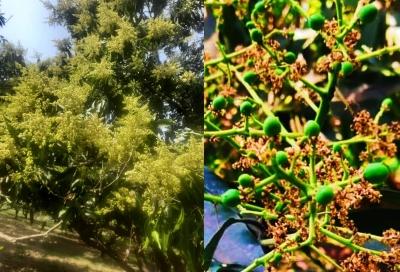As flowers bloom copiously on mango trees, Bihar's farmers expect bumper harvest

The mango trees in the state are laden with flowers or 'manjar', and the farmers are busy protecting them from any kind of disease or natural disaster.
In India, the major mango-growing states are Uttar Pradesh, Gujarat, Karnataka, Andhra Pradesh, West Bengal and Bihar, among others.
National productivity of mango is 8.80 tonnes per hectare.
In Bihar, mango is cultivated in an area of 160.24 thousand hectares with production of 1,549.97 thousand tonnes.
Mango productivity in Bihar is 9.67 tonnes per hectare, which is slightly higher than the national productivity.
Bihar ranks 13th among 27 states in the list of mango-producing states.
Bihar is known for its wide variety of mangoes, which includes 'Dudhiya Malda', 'Jardalu', and 'Gulab Khaas', among others.
Among the different types of mangos produced in Bihar, the 'Jardalu' variety of Bhagalpur got the Geographical Indication (GI) tag in 2018, which shows the uniqueness of the fruit.
The Agricultural and Processed Food Products Export Development Authority (APEDA), in collaboration with the state government, has exported 4.5 lakh tonnes of organic Jardalu mangos to Bahrain, Belgium and the UK.
The specialty of this variety is that if the saplings are planted anywhere other than Bhagalpur, the fruit will lose its fragrance.
Seeing its specialty, the government has decided to expand the production of this variety to Munger and Banka, which are adjacent to Bhagalpur and have similar soil pattern.
The other varieties produced in Bihar include 'Fazli', 'Sukul', 'Sepia', 'Chausa', 'Kalkatiya', 'Amrapali', 'Mallika', 'Sindhu', 'Ambika', 'Mahmud Bahar', 'Prabha Shankar' and 'Biju'.
The 'Jardalu' variety of Bhagalpur, 'Dudhiya Malda' of Digha and 'Chausa' of Buxar are not just sold in different parts of India, but are also exported to other countries.
A mango grower told IANS: "This year the mango trees have blossomed well. We are speculating that if the 'manjars' are saved from storm, this year there will be a bumper yield of mangos."
A farmer from Bhagalpur said: "The production in the area has been not been good for the last three years, but this year the mango trees are in bloom and there is hope of a good crop. This is the time to protect the flowers from germs and heat."
S.K. Singh, chief scientist and co-director of research at Rajendra Prasad Central Agricultural University, Samastipur, who has done detailed research on the diseases that affect mango trees, said that there is no use of pesticides at this juncture.
"Wait until the fruits are equal to the size of peas, after which you can use pesticides. At this time, a large number of bees have come to the mango orchards, and we should not disturb them because they are doing pollination work in the orchards," he said.
Singh added: "If you sprinkle any kind of medicine, it will harm the bees and there is a possibility of the delicate parts of the flowers getting damaged."
Disclaimer: This story has not been edited by the Sakshi Post team and is auto-generated from syndicated feed.




